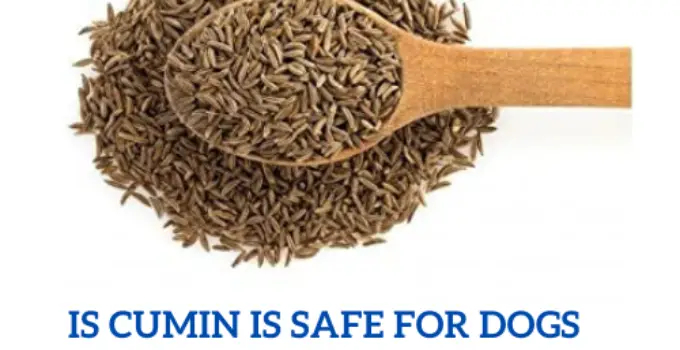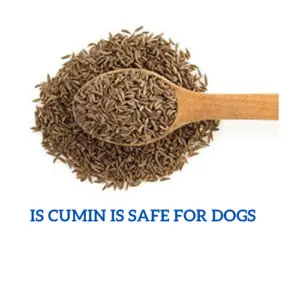Dogs are curious creatures and often enjoy trying new things, including food. But can dogs eat cumin? Cumin is a common spice that is used in many recipes. But the question arises, Is it safe for dogs to consume?
In this blog post, we’ll explore whether dogs can eat cumin and the potential health benefits and risks. We’ll also provide some tips on how to incorporate cumin into your dog’s diet safely. So if you’re curious about whether cumin is safe for your pup, let’s explain step by step is cumin safe for dogs.
What is cumin, and where does it come from
Cumin is a spice that comes from the dried fruit of a plant related to the carrot. It is commonly used in Indian, Mediterranean, and Mexican cuisine. The spice has a slightly nutty taste and can be added to many dishes to give them a little flavor boost.
Can cumin be given to dogs in any form?
Yes, cumin can be given to dogs in powder and seed form. However, it’s important to note that cumin can be a choking hazard for dogs, so always make sure your dog is supervised when eating cumin.
What are the health benefits of cumin for dogs?
Cumin is a great spice to add to your dog’s food, as it has some potential health benefits. Some key benefits include:
- Cumin can help improve digestion, as it helps to stimulate the production of digestive juices. It can help to improve your dog’s appetite and can also help to reduce gas and bloat.
- Cumin is a good source of vitamins and minerals, including iron, magnesium, and potassium. It can help to improve your dog’s overall health and vitality.
- Cumin can also help fight inflammation and can effectively treat arthritis and other joint problems.
What are the risks when dogs eat cumin?
Like with any other food, there are always some risks associated with dogs eating cumin. Some potential risks include:
- Cumin can cause stomach upset in dogs. It can lead to vomiting and diarrhea and be pretty unpleasant for your pup.
- Cumin can also be a choking hazard for dogs. It is especially true if the spice is given in large doses or ground up into a fine powder.
- Cumin can also interact with certain medications that your dog may be taking. So it’s essential to speak to your veterinarian before adding cumin to your dog’s diet if he is taking medication.
- Lastly, cumin can also have a laxative effect on dogs.
How can you safely add cumin to your dog’s diet?
If you’re thinking of adding cumin to your dog’s diet, there are a few things you need to keep in mind.
First, it’s essential to start slowly and give your dog only a small amount at first.
It will help to ensure that your pup doesn’t experience any stomach upset.
You can gradually increase the amount over time as your dog becomes used to it.
Also, be sure to always grind up cumin seeds into a fine powder before giving them to your dog.
It will help reduce the risk of choking. And finally, if your dog is taking any medications, be sure to speak to your veterinarian before adding cumin to his diet, as it can potentially interact with the medication.
Recipes that include cumin for your pup
If you’re looking for some recipes that include cumin for your pup, here are a few ideas to get you started:
- Cumin can be a great addition to chicken or beef stews. It can give the dish a little extra flavor and can help to improve digestion.
- Cumin also is added to the dog’s breakfast cereal. It can help add some extra nutrients and help with digestion.
- You can also make cumin-infused water for your dog. Add 1 teaspoon of cumin seeds to a cup of hot water and let it steep for 10 minutes. Then, allow the water to cool before giving it to your dog.
- It can be a great way to help with digestion and can also help to improve your dog’s overall health.
Can cumin be used as a treatment for dogs with diarrhea?
There is limited evidence on cumin for treating diarrhea in dogs. However, there is some anecdotal evidence that suggests it may be helpful. Speak to your veterinarian if you’re considering using cumin to treat diarrhea in your dog.
Alternatives to cumin if your dog can’t eat it
If your dog can’t eat cumin, there are several other spices that you can use as alternatives. Some good options include:
- Ginger – Ginger can be a great spice to add to a dog’s food as it can help with digestion and can also help to fight inflammation.
- Basil – Basil is a flavorful herb that can add to many dishes. It is a good source of vitamins and minerals, including vitamin A and magnesium.
- Garlic – Garlic is another flavorful herb that can add to dog food. It has many health benefits, including being a natural antibiotic.
Tips How to keep your dog safe while trying new foods
It’s always important to take precautions when feeding your dog new foods. Here are a few tips to help keep your dog safe:
- Start with a small amount and gradually increase the amount as your dog becomes used to it. It will help to ensure that your pup doesn’t experience any stomach upset.
- Always grind up cumin seeds into a fine powder before giving them to your dog. This will help reduce the risk of choking.
- If your dog is taking any medications, be sure to speak to your veterinarian before adding cumin to his diet, as it can potentially interact with the medication.
- Lastly, monitor your dog for any signs of adverse reactions when trying new foods. If you notice any changes in your dog’s behavior or if he experiences any stomach upset, stop giving him the new food and consult with your veterinarian.
Conclusion
Cumin can be a great addition to your dog’s diet, but it can also pose some risks? Cumin is most commonly used in the cuisine of Middle Eastern countries and can provide additional nutrients like iron and calcium.
But before you start throwing cumin into everything that you serve your pup, there are a few things you need to know first.
First, if your pup has any pre-existing medical conditions or takes medications, talk with your vet before adding this spice to their food, as it can interact with certain drugs.
Secondly, always grind up cumin seeds when giving them to your pet, so they don’t choke on chunks that may get stuck in their throat. And finally, monitor how often you give them the new food to avoid any stomach upset. Cumin can be a great way to add some extra flavor and nutrients to your dog’s diet with a bit of caution.



No Responses